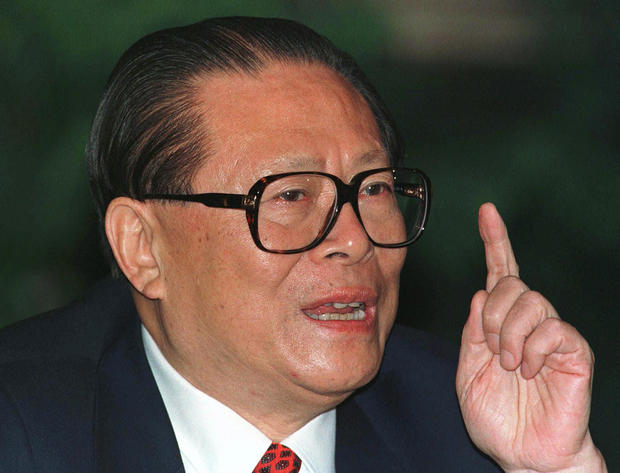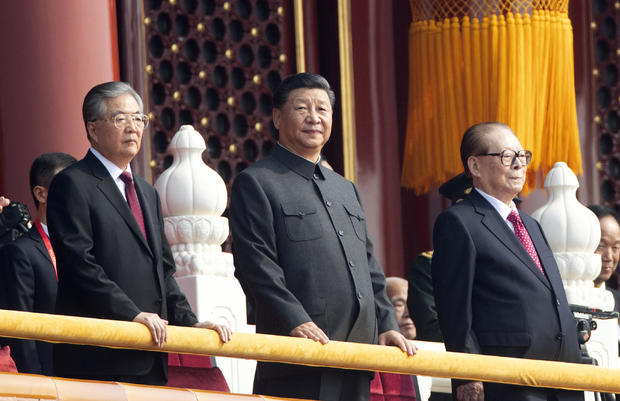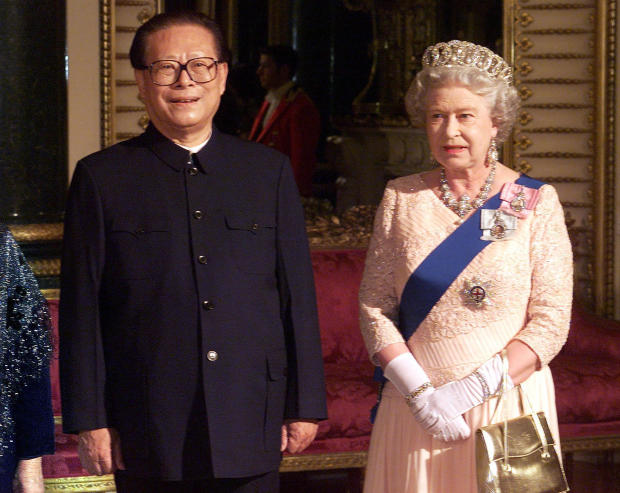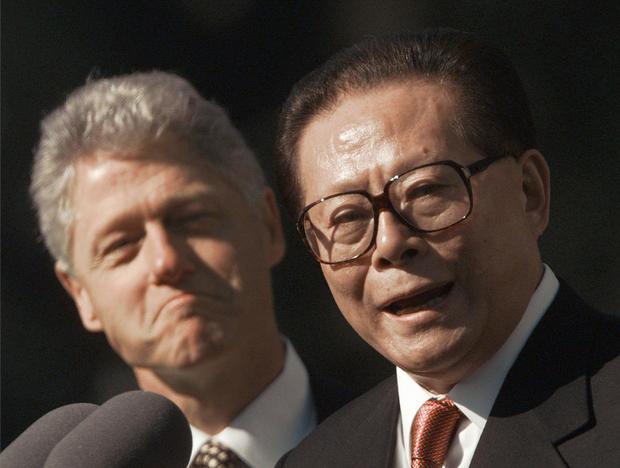Beijing — Former Chinese President Jiang Zemin, who led his country out of isolation after the crushing of pro-democracy protests in Tiananmen Square and supported economic reforms that led to a decade of explosive growth, has died, state TV said.
He was 96. Jiang died in Shanghai, state TV reported on its website. A surprise choice to lead a divided Communist Party after the 1989 Tiananmen crackdown, Jiang saw China through history-making changes including a revival of market-oriented reforms, the return of Hong Kong from British rule in 1997 and Beijing’s entry into the World Trade Organization in 2001.

Even as China opened to the outside, Jiang’s government stamped out dissent at home. It jailed human rights, labor and pro-democracy activists and banned the Falun Gong spiritual movement, which it viewed as a threat to the Communist Party’s monopoly on power. Jiang gave up his last official title in 2004 but remained a force behind the scenes in the wrangling that led to the rise of current President Xi Jinping, who took power in 2012. Xi has stuck to Jiang’s mix of economic liberalization and strict political controls.

Initially seen as a transitional leader, Jiang was drafted on the verge of retirement with a mandate from then-paramount leader Deng Xiaoping to pull together the party and nation. But he proved transformative. In 13 years as Communist Party general secretary, the top position in China, he guided China’s rise to global economic power by welcoming capitalists into the Communist Party and pulling in foreign investment after China joined the WTO. He presided over the nation’s rise as a global manufacturer, the return of Hong Kong and Macao from Britain and Portugal and the achievement of a long-cherished dream: winning the competition to host the Olympic Games after an earlier rejection.
A former soap factory manager, Jiang capped his career with the communist era’s first orderly succession, handing over his post as party leader in 2002 to Hu Jintao, who assumed the presidency the following year. Jiang tried to hold onto influence by staying on as chairman of the Central Military Commission, which controls the party’s military wing, the 2.3 million-member People’s Liberation Army. He gave up that post in 2004 following complaints he might divide the government. Even after he left office, Jiang had influence over promotions through his network of proteges.
He was said to be frustrated that Deng had picked Hu as the next leader, blocking Jiang from installing his own successor. But Jiang was considered successful in elevating allies to the party’s seven-member Standing Committee, China’s inner circle of power, when Xi became leader in 2012. Portly and owlish in oversize glasses, Jiang was an ebullient figure who played the piano and enjoyed singing, in contrast to his more reserved successors, Hu and Xi.
He spoke enthusiastic if halting English and would recite the Gettysburg Address for foreign visitors. On a visit to Britain, he tried to coax Queen Elizabeth II into singing karaoke. “Jiang had faded from public sight and last appeared publicly alongside current and former leaders atop Beijing’s Tiananmen gate at a 2019 military parade celebrating the party’s 70th anniversary in power. He was absent from a major party congress last month where former leaders are given seats in recognition of their service.
Jiang was born Aug. 17, 1926, in the affluent eastern city of Yangzhou. Official biographies downplay his family’s middle-class background, emphasizing instead his uncle and adoptive father, Jiang Shangqing, an early revolutionary who was killed in battle in 1939.

After graduating from the electrical machinery department of Jiaotong University in Shanghai in 1947, Jiang advanced through the ranks of state-controlled industries, working in a food factory, then soap-making and China’s biggest automobile plant. Like many technocratic officials, Jiang spent part of the ultra-radical 1966-76 Cultural Revolution as a farm laborer.
His career rise resumed, and in 1983 he was named minister of the electronics industry, then a key but backward sector the government hoped to revive by inviting foreign investment. As mayor of Shanghai in 1985-89, Jiang impressed foreign visitors as a representative of a new breed of outward-looking Chinese leaders. He was preparing to retire when Deng picked him in 1989 to replace party General Secretary Zhao Ziyang, who was purged due to his sympathy for the Tiananmen protesters and held under house arrest until his death in 2005. A tough political fighter, Jiang defied predictions that his stint as leader would be short. He consolidated power by promoting members of his “Shanghai faction” and giving the military double-digit annual percentage increases in spending.
Foreign leaders and CEOs who shunned Beijing after the crackdown were persuaded to return. When Deng emerged from retirement in 1992 to push for reviving market-style reform in the face of conservative opposition after the Tiananmen crackdown, Jiang followed. He supported Premier Zhu Rongji, the party’s No. 3 leader, who forced through painful changes that slashed as many as 40 million jobs in state industry in the late 1990s. Zhu also launched the privatization of urban housing, igniting a building boom that transformed Chinese cities into forests of high-rises and propelled economic growth. After 12 years of negotiations and a flight by Zhu to Washington to lobby the Clinton administration for support, China joined the WTO in 2001, cementing its position as a magnet for foreign investment.

Despite a genial public image, Jiang dealt severely with challenges to ruling party power. His highest-profile target was Falun Gong, a meditation group founded in the early ’90s. Chinese leaders were spooked by the group’s ability to attract tens of thousands of followers, including military officers. Activists who tried to form an opposition China Democracy Party, a move permitted by Chinese law, were sentenced to up to 12 years in prison on subversion charges. “Stability above all else,” Jiang ordered, in a phrase his successors have used to justify intensive social controls. It fell to Jiang, standing beside Britain’s Prince Charles, to preside over the return of Hong Kong on July 1, 1997, symbolizing the end of 150 years of European colonialism.
The nearby Portuguese territory of Macao was returned to China in 1999. Hong Kong was promised autonomy and became a springboard for mainland companies to go abroad. Meanwhile, Jiang turned to coercion with Taiwan, the self-ruled island Beijing says is part of its territory. During Taiwan’s first direct presidential election in 1996, Jiang’s government tried to intimidate voters by firing missiles into nearby shipping lanes. The United States responded by sending warships to the area in a show of support.
At the same time, trade between the mainland and Taiwan grew to billions of dollars a year. China’s economic boom split society into winners and losers, as waves of rural residents migrated to factory jobs in cities, the economy grew sevenfold and urban incomes by nearly as much. Protests, once rare, spread as millions lost state jobs and farmers complained about rising taxes and fees. Divorce rates climbed. Corruption flourished.
One of Jiang’s sons, Jiang Mianheng, courted controversy in the late 1990s as a telecommunications dealmaker and later the chairman of phone company China Netcom Co. Critics accused him of misusing his father’s status to promote his career, a common complaint against the children of party leaders. Jiang Mianheng, who has a Ph.D. from Drexel University, went on to hold prominent academic positions, including president of ShanghaiTech University in his father’s old power base. Jiang is survived by his two sons and his wife, Wang Yeping, who worked in government bureaucracies in charge of state industries.
This article was first published in CBS News . All contents and images are copyright to their respective owners and sources.










